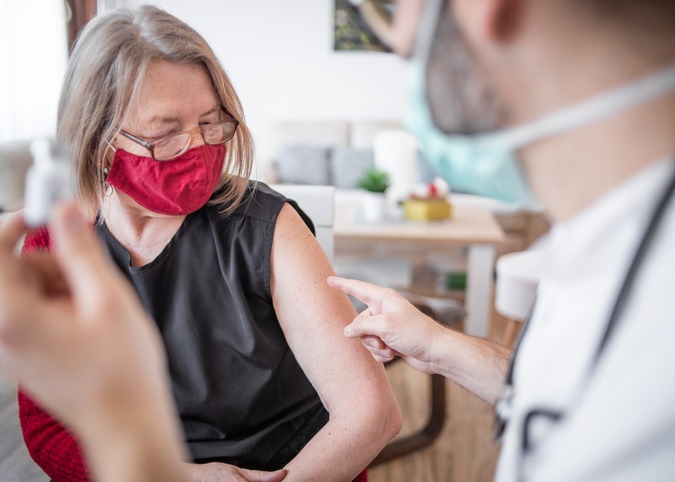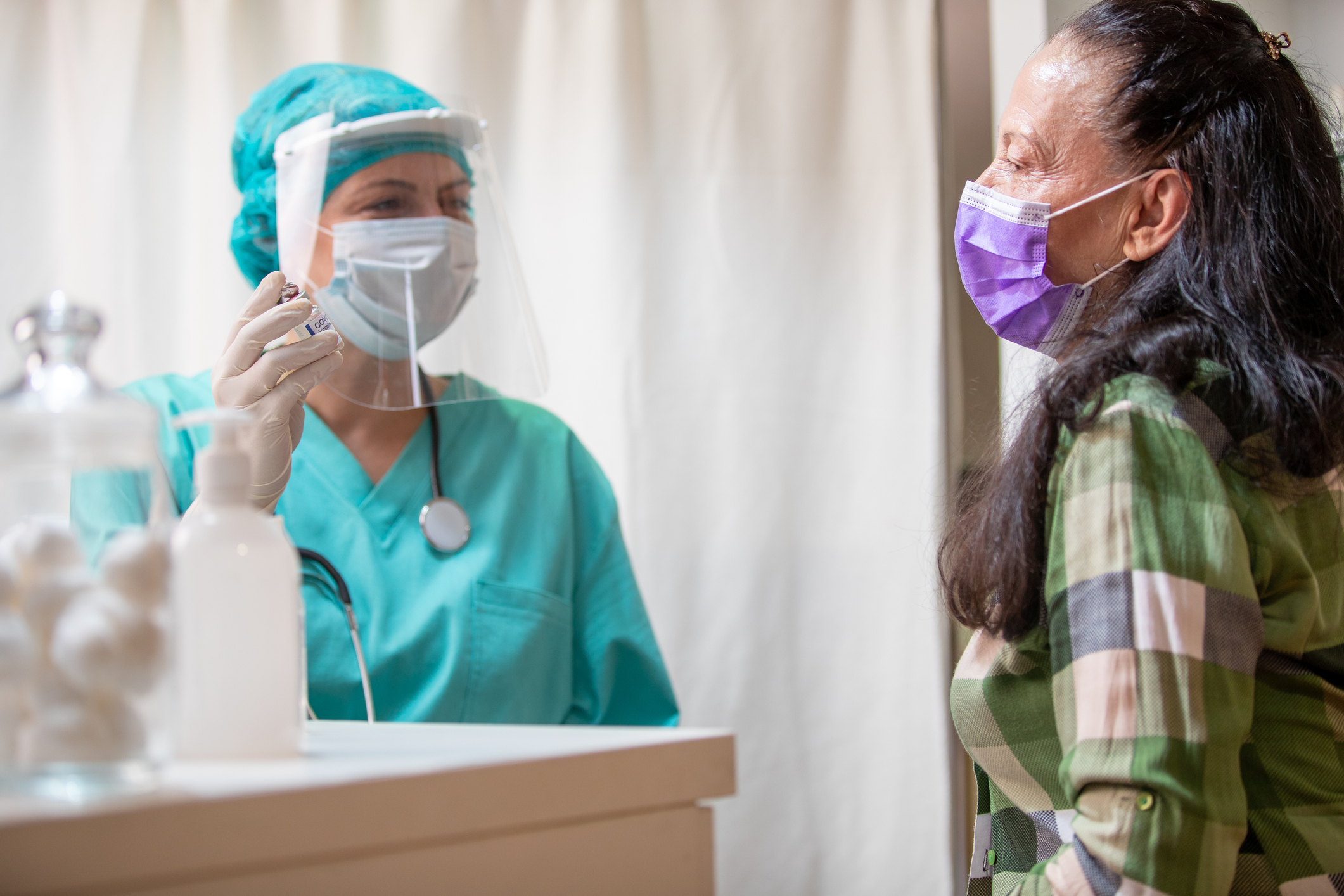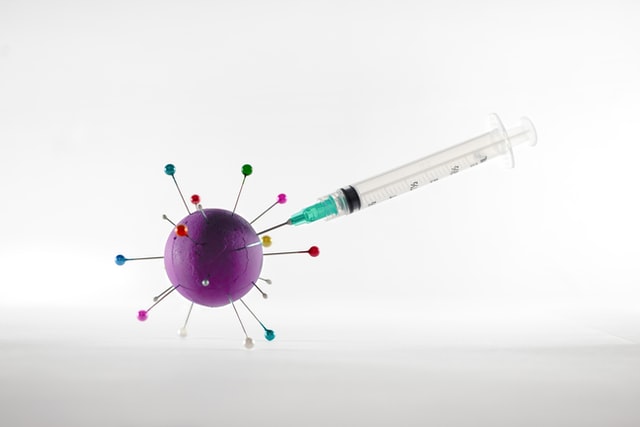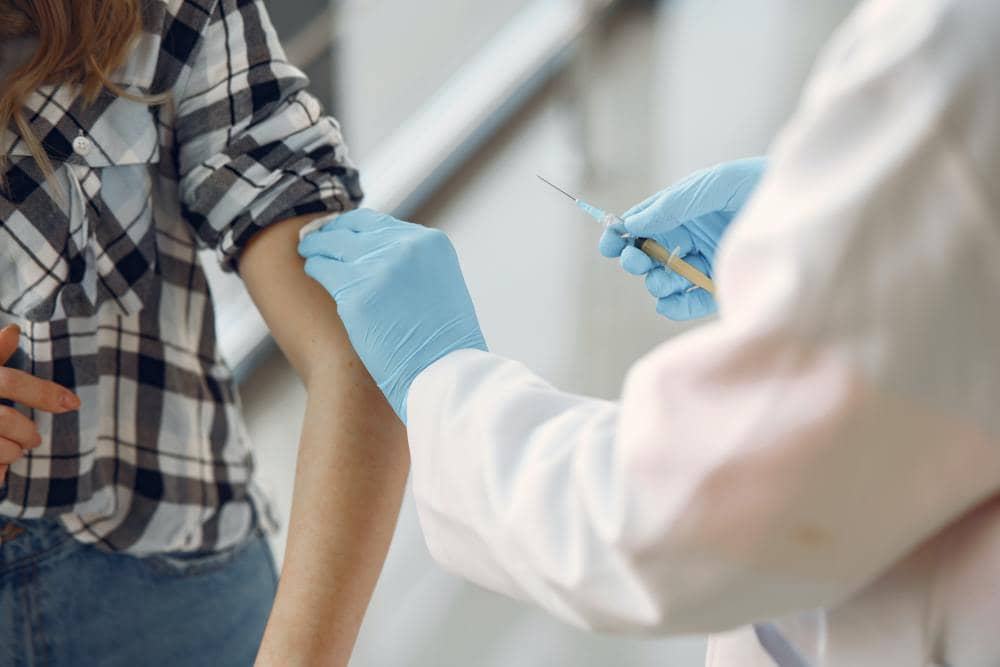Note: This story was first published on 18 December 2020 and last updated on 5 January 2022. Healthily will continue to update this story as new information becomes available.
Since the start of the COVID-19 pandemic, groups of scientists around the world worked to develop a vaccine. And most countries are now vaccinating their population or about to start vaccination programmes.
A national immunisation campaign has been underway in the UK since early December 2020, with 3 COVID-19 vaccines currently being used:
- Pfizer/BioNTech vaccine
- Oxford/AstraZeneca vaccine
- Moderna vaccine
These vaccines have been authorised for supply by the Medicines and Healthcare products Regulatory Agency (MHRA) following a thorough review of safety, quality and efficacy from clinical trials. Another vaccine, the Janssen vaccine, is approved for use in the UK, but isn’t currently being used.
Most people can have any of the approved COVID-19 vaccines. But the following exceptions apply:
- if you’re under 40 or pregnant, you’ll usually be offered the Moderna or Pfizer/BioNTech vaccine
- if you’re under 18, you’ll only be offered the Pfizer/BioNTech vaccine
Here are the key things you need to know about COVID-19 vaccines, including how they work, when you might get a vaccine, and how effective they are.
How do COVID-19 vaccines work?
A vaccine works by training your body’s defences (immune system) to spot and fight off the virus or bacteria it’s designed for. If you’re then exposed to those germs, your immune system will fight back and stop you from getting seriously ill, or even stop you getting ill at all.
There are several types of vaccine being made for COVID-19, including:
- viral vector vaccines – these use a different virus (not the one that causes COVID-19),to carry bits of the COVID-19 virus into your body– this is called a 'viral vector'. It doesn't cause disease, but it makes your immune system respond to the COVID-19 elements in the vaccine. The Oxford/AstraZeneca vaccine is a viral vector vaccine
- mRNA vaccines –these contain instructions that teach your body to make and then recognise a 'spike protein' from the COVID-19 virus.This trains your immune system, so if you’re exposed to the COVID-19 virus, you’re prepared to fight it. The Pfizer/BioNTech and Moderna vaccines are mRNA vaccines
- protein-subunit vaccines – these use harmless pieces of protein not from the COVID-19 virus, that imitate the virus. They are close enough to make your immune system respond, so that if you come into contact with the real COVID-19 virus you will be protected
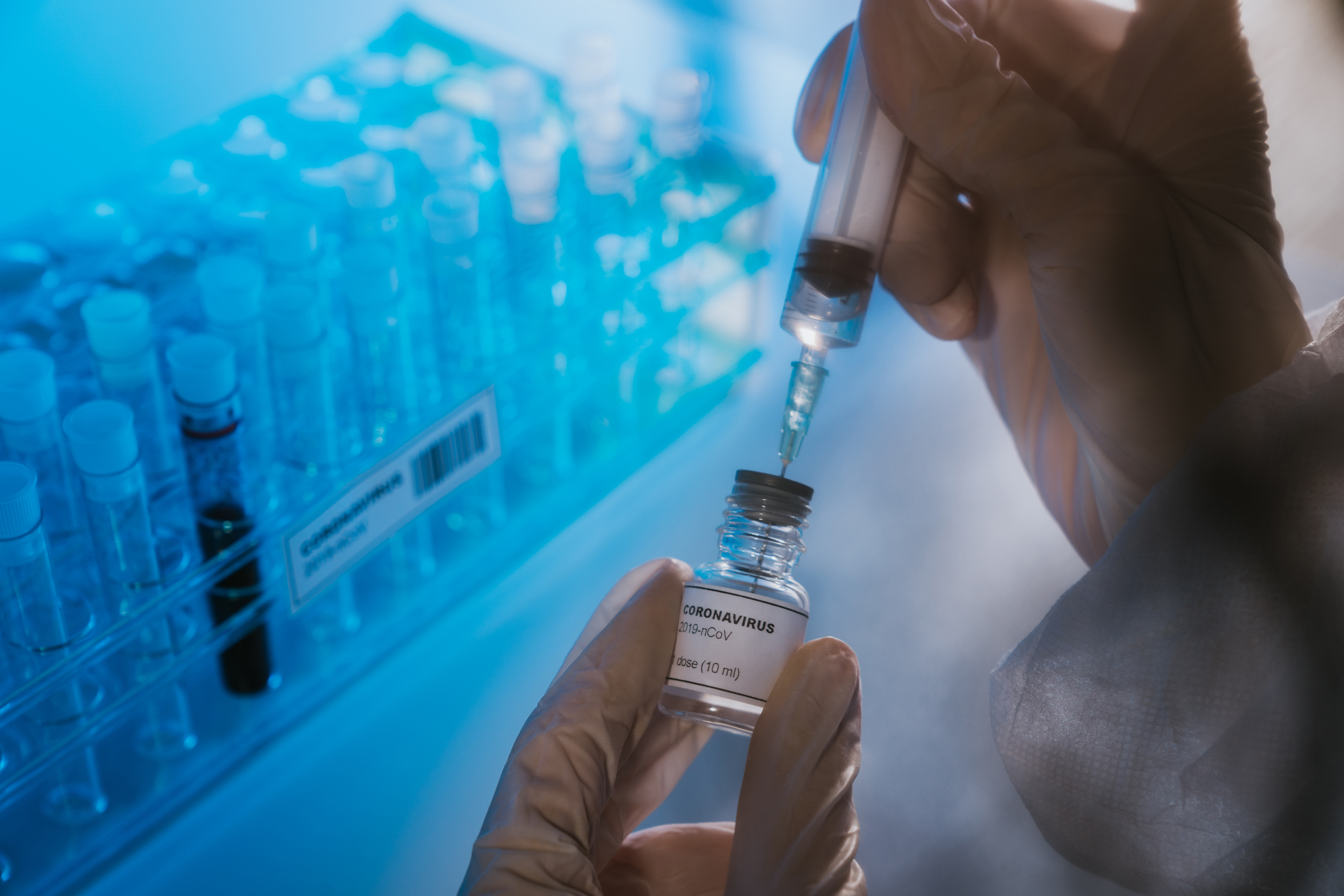
How quickly does the COVID-19 vaccine start working?
After having a COVID-19 vaccination, it usually takes the body a few weeks to make the white blood cells that fight the virus. This means it’s possible to get infected by the virus just before or after having the vaccine and then become unwell, because the vaccine didn’t have enough time to work.
After your first dose, it takes 3 to 4 weeks before your body has built up enough antibodies to properly provide immune protection. You will need a second dose to give you better protection, for longer.
Many people will now also get a ‘booster’ dose at a later date to give maximum protection against new variants of the virus, such as the Omicron (see below for details).
How effective is a COVID-19 vaccine?
How well the COVID-19 vaccine works varies very slightly depending on which vaccine you have.
Evidence suggests that booster vaccines provide more than 90% protection against symptomatic COVID-19 infection in adults aged 50 years and over, 2 weeks after receiving the vaccine.
With the new Omicron variant of COVID-19, it now appears that a booster dose is required to keep vaccine effectiveness as high as possible.
A vaccine’s effectiveness (known as efficacy) is worked out by comparing the risk of disease for people who have been vaccinated with people who haven’t. So, 90% effectiveness means that a group of vaccinated people would have 90% fewer cases of the virus than they would if they hadn’t been vaccinated.
Is the COVID-19 vaccine safe?
In the UK, the approved COVID-19 vaccines have gone through the clinical trials and safety checks that all licensed medicines have to go through.
The UK’s Medicines and Healthcare products Regulatory Agency (MHRA) has now confirmed that the Pfizer, AstraZeneca and Moderna vaccines can be used as safe and effective booster doses.
The MHRA says that for people over 40 or those with other health conditions, the benefits of the vaccine outweigh any potential risk. For people under 40 without other health conditions, the current advice is that it's better to have the Pfizer or Moderna vaccine.
As with any medicines some people experience side effects but they are mostly mild and don’t last more than a week. But in some rare cases, the vaccines can have more serious side effects. Find out more about side effects below.
Do the pneumonia vaccines work against COVID-19?
Pneumonia is lung inflammation that's usually caused by bacteria or viruses including severe COVID-19. Vaccines for COVID-19 will help protect against pneumonia which can occur in severe COVID-19.
Other vaccines that can help prevent other causes of pneumonia include the pneumococcal vaccine, the haemophilus influenza type b (Hib) vaccine and the influenza vaccine.These won't prevent COVID-19 - but sometimes getting COVID-19 can increase your risk of getting a bacterial pneumonia and being vaccinated against pneumococcal and Hib may help prevent this complication.
When will I get a COVID-19 vaccine?
When you’ll be offered a COVID-19 vaccine depends on several things, including which country you live in, your government’s plans, and how at risk you are from the virus.
The World Health Organization (WHO) says certain groups of people should get the vaccine first, because they’re at high risk. These include frontline health and care workers who are likely to get infected, older adults (WHO says this means people over 60 but in the UK the vaccine roll-out has prioritised people over 50), and people at a high risk of death from the virus because of other health conditions (such as diabetes or heart disease). The WHO says other groups of people should get a vaccine after these priority groups have been protected, when more doses of vaccine are available.
When will I get a COVID-19 booster jab?
In the UK, in early December 2021 around 70% of the population had been given 2 doses of a vaccine. An urgent booster vaccination programme was also rolled out, partly to help protect against the new Omicron variant.
In the UK, you can get a booster jab if you had a 2nd dose of a COVID-19 vaccine at least 3 months ago and:
- you’re 18 or over
- you’re a frontline health or social care worker
- you live or work in a care home
- you’re 16 or over and have a condition that puts you at high risk from COVID-19; are a main carer for someone at high risk from COVID-19; or live with someone who has a weakened immune system
Do I need a COVID-19 vaccine if I’ve already had the virus?
You’ll be offered the vaccine whether or not you’ve had COVID-19. But if you currently have COVID-19, you should wait until you’ve recovered to have your vaccine.
In the UK, the guidance is that you should wait until at least 4 weeks after your symptoms started – or after your positive test if you didn’t have any symptoms. People under 18 who aren’t in high-risk groups should ideally wait 12 weeks.
How is a COVID-19 vaccine given?
Most of the COVID-19 vaccines are given by an injection into the arm and you’ll need 2 doses, given at different times (plus a booster dose after this). Evidence shows that:
- the 1st dose of the vaccine provides some protection in the short term, starting from 3 to 4 weeks after you’ve had it
- people aged 18 or over should have their second dose from 8 weeks after their 1st dose
- people aged 16 or 17 should have their 2nd dose from 12 weeks after their 1st dose
- all 12 to 15 year-olds in the UK are currently being offered a dose of the Pfizer COVID vaccine. They may be offered a 2nd dose 3 months later if they live with someone who is more likely to get infections or they have a condition that means they’re at high risk from COVID-19
- people with severely weakened immune systems can have a 3rd primary dose, given 8 weeks after the 2nd dose. They can also have a booster dose, which can be given at least 3 months (12 weeks) after the 3rd primary dose
Under-12s in the UK are currently not part of the national vaccination campaign. But over 5s are being offered vaccines in some other countries, so this may change.
In the UK, it isn’t the law (compulsory) that people have a COVID-19 vaccine. But all frontline NHS staff in England will have to be fully vaccinated by 1 April 2022 (with some exceptions). All care home staff in England must now be vaccinated unless they’re exempt for medical reasons.
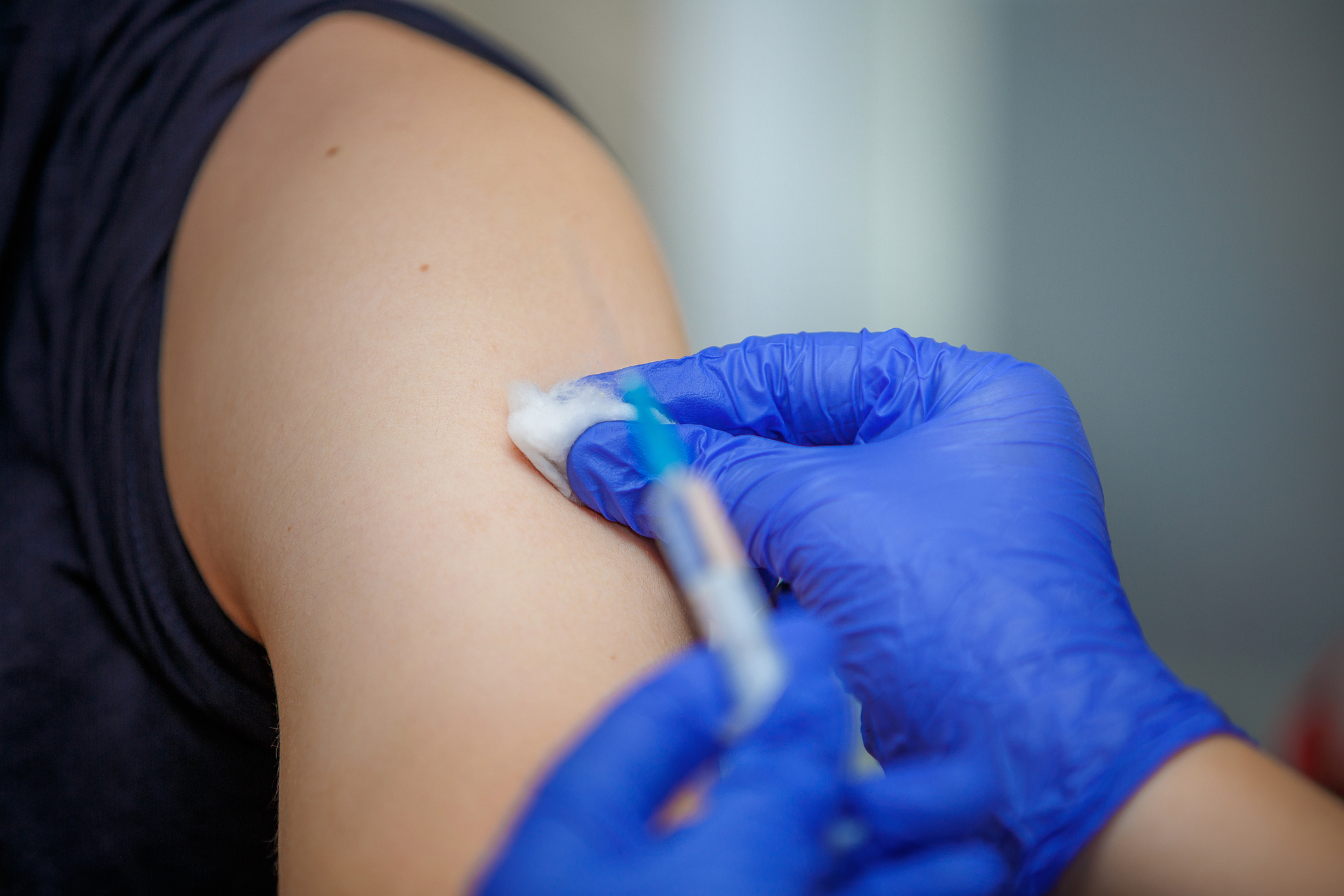
What are the side effects of the COVID-19 vaccine?
Like all medicines, vaccines can cause side effects. However, side effects of the COVID-19 vaccine are usually mild and shouldn’t last longer than a week. They can include:
- a sore arm at the injection site
- feeling tired
- headache
- feeling achy
- feeling or being sick
- fever – you may get a high temperature or feel hot or shivery 1 or 2 days after your vaccination. You can take painkillers such as paracetamol if you need to. If your symptoms get worse or you're worried, call a doctor
If you have a high temperature that lasts longer than 2 days, a new, continuous cough or a loss of or change to your sense of smell or taste, you may have COVID-19. You can’t catch COVID-19 from the vaccine, but you may have caught it just before or after your vaccination.
Read more about the side effects of the COVID-19 vaccine.
Very rare side effects
Allergies
In a very small number of cases, people have had an allergic reaction to the vaccine. This is most likely to happen within a few minutes of being vaccinated, and vaccination staff will be trained in how to look after you if this happens.
If you think you’re having an allergic reaction, call for urgent medical help.
Blood clots
There have been a very small number of reports of blood clotting problems in people who have had the Oxford/AstraZeneca vaccine. It’s not yet clear why this happens, and it’s extremely rare.
Get urgent medical advice if you have any of these symptoms from 4 days to 4 weeks after having a vaccine:
- a really bad headache that doesn’t go away with painkillers, or is getting worse
- a headache that’s different from headaches you usually have, plus blurred vision, feeling or being sick, problems speaking, weakness, sleepiness or fits (seizures)
- a headache that feels worse when you lie down or bend over
- shortness of breath, leg swelling, chest pain or tummy pain that doesn’t go away
- a rash that looks like small bruises or bleeding under the skin
Heart inflammation
There have also been rare reports of people getting heart inflammation (myocarditis) after getting a COVID-19 vaccine. Most people recover after simple treatments.
You should get urgent medical advice if you have any of these symptoms a few days after having a COVID-19 vaccine:
- chest pain
- shortness of breath
- a fast-beating, fluttering or pounding heart (palpitations)
Advice if you’re pregnant or breastfeeding
If you're pregnant and haven’t had a COVID-19 vaccine yet, it's preferable for you to have the Pfizer/BioNTech or Moderna vaccine. This is because these vaccines have been more widely used during pregnancy in other countries and no safety concerns have been identified.
If you've already had the Oxford/AstraZeneca vaccine for your 1st dose and didn’t have any serious side effects, you should have it again for your 2nd dose. The vaccines can’t give you or your baby COVID-19.
If you're breastfeeding, the vaccines you can have depend on your age. If you're 40 or over, you can have any of the COVID-19 vaccines. If you're under 40 and don’t have a health condition that increases your risk of getting seriously ill from COVID-19, it's preferable for you to have the Pfizer/BioNTech or Moderna vaccine.
You can’t catch COVID-19 from the vaccines, and you can’t pass it to your baby through your breast milk.
Advice if you have an underlying medical condition
People with certain underlying medical conditions are at high risk of severe illness from COVID-19. They may have the vaccine, as long as they haven’t had a serious allergic reaction to any of the vaccine’s ingredients, and this includes people who are immunosuppressed.
If you’re immunosuppressed, it’s very important to keep taking measures to protect yourself from catching COVID-19, even once you’ve had the vaccine.
The vaccine is safe for people with lung conditions and there are very few people who shouldn’t get the vaccine.
You shouldn’t get the vaccine if you've had a confirmed anaphylactic reaction to any of the ingredients in the vaccine, or a previous dose of the vaccine.
If you have an underlying medical condition and are in any way unsure if you should have the vaccine, you should speak to a healthcare professional before having it.
If you’re unwell on the day you’re supposed to have your vaccine, talk to your doctor – they may recommend postponing until you have recovered.
Key takeaways
- COVID-19 vaccinations work by training your body’s defences to spot and fight off the virus
- there are 3 vaccines currently in use in the UK: Pfizer/BioNTech, AstraZeneca and Moderna
- it’s recommended that most people have 2 doses of a vaccine, a certain distance apart, followed by a booster dose
- most side effects from the COVID-19 vaccine are mild and short-lived
- the vaccines have been shown to give very good against COVID-19




